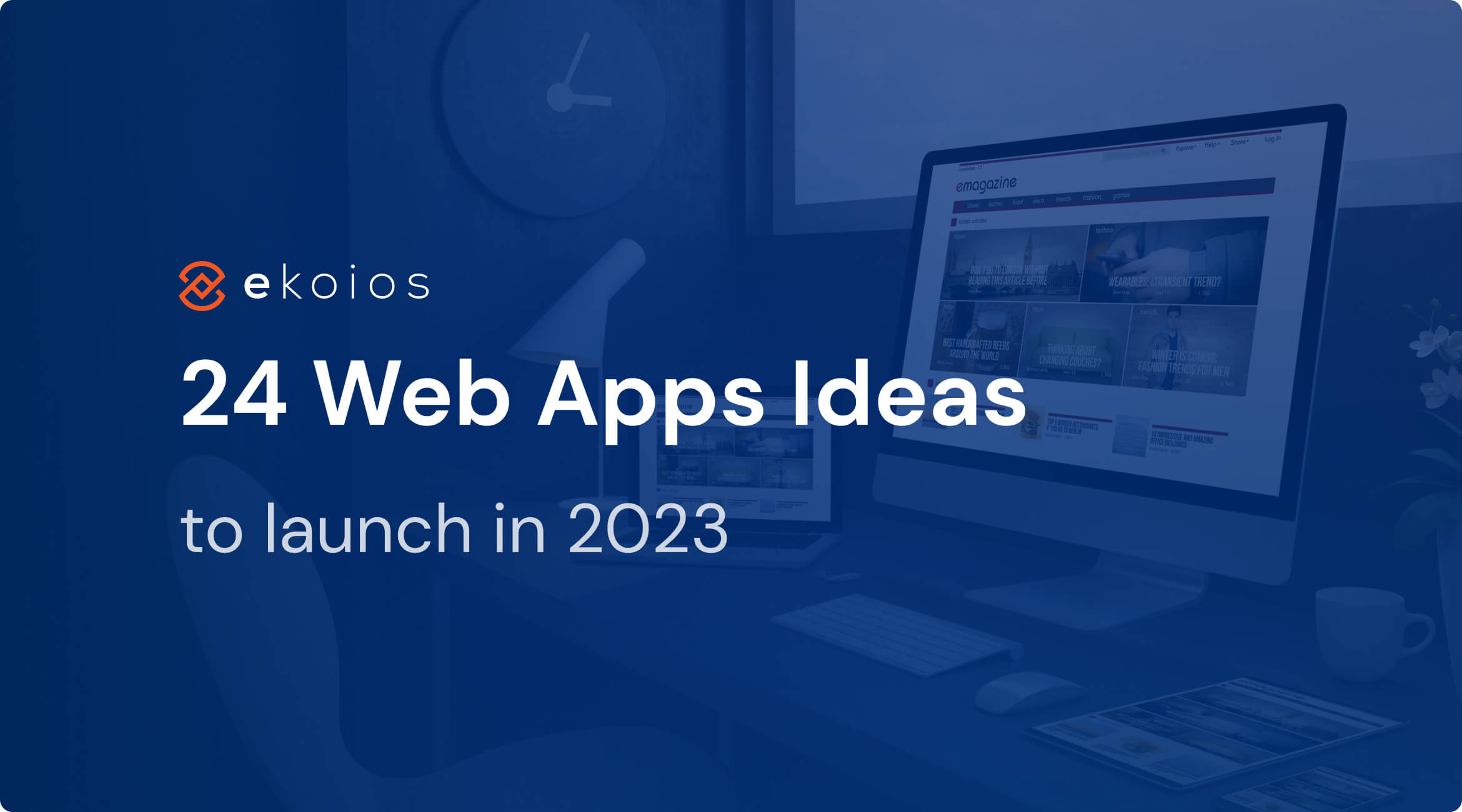
- 1
- 2
- 3
- 4
The digital world is constantly evolving, and with it comes the need for innovative web apps that cater to people’s needs. Entrepreneurs and startups are always on the lookout for fresh ideas to create a successful business. In 2023, the demand for new web apps will continue to grow, providing ample opportunities for aspiring entrepreneurs. This article explores 24 innovative web app ideas that can help startups and entrepreneurs launch their businesses successfully. Let’s dive right in!
What Is a Web Application?
A web application is a software program that is accessed through a web browser. It can be used to store and manage data, create interactive user experiences, and provide users with access to a variety of services. Web application development is often built using open-source technologies such as HTML, CSS, JavaScript, and PHP.
Advantages of Web App Compared to Native App
- Ability to access the app from any device with a web browser
- No need for users to download or install software
- Easier maintenance and updates
- Improved security with centralized data storage and backup
- Scalability to handle large user bases and high-traffic volumes
9 Types of Web Applications
Web applications can be broadly categorized into nine main types:
- Static web application: a website that is comprised of fixed content and displays the same information to all users.
- Dynamic web application: interactive apps that can update content without reloading the entire page.
- Single page application: fits on a single web page with the goal of providing a more fluid user experience akin to a desktop application.
- Multiple page application: consists of multiple pages that are loaded from the server as the user navigates through the application.
- Animated web application: uses animations and transitions to create a more engaging user experience.
- Content management system: allows users to create, manage, and publish digital content, such as webpages, blogs, and products.
- E-commerce application: allows businesses to sell products or services online, process payments, and manage orders and inventory.
- Portal web application: provides access to a variety of resources and services, such as email, news, weather updates, and other information, through a single point of entry.
- Progressive web application: functions like native mobile apps and provides an app-like user experience.
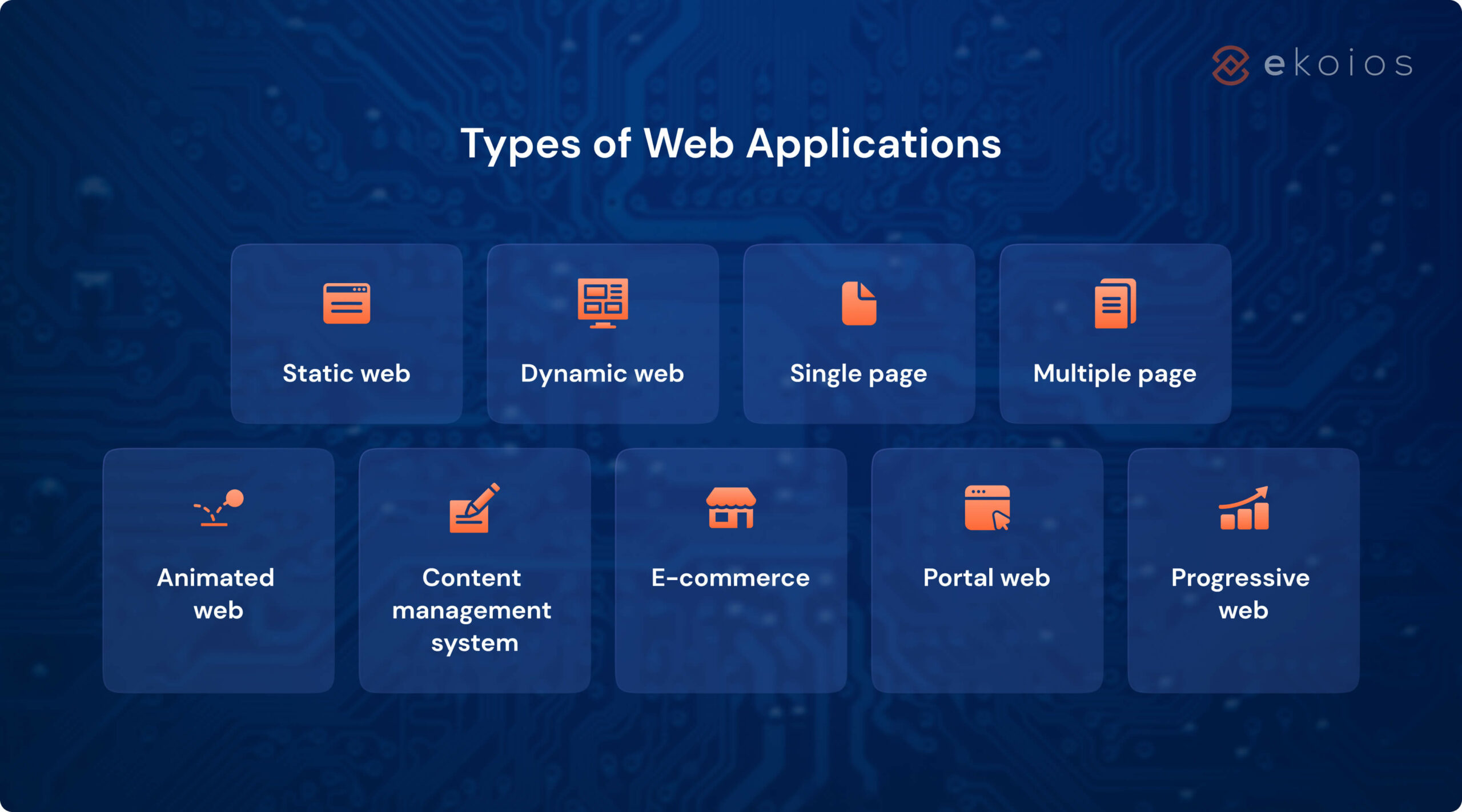
24 innovative web app ideas to make money in 2023
Artificial Intelligence (AI) Web Apps
1. AI Chatbots
Chatbots are a great way to provide 24/7 customer service to your customers. They can answer questions, provide personalized advice and recommendations, and even help customers complete purchases. AI-powered chatbots are able to provide more accurate responses and handle more complex inquiries and tasks than traditional chatbots. They can also integrate with other business tools and platforms, such as CRM software, social media, and e-commerce platforms, to provide a seamless customer experience.
Factsheets:
- Possible Business model: Subscription-based, pay-per-use.
- MVP build time: 2 months
- Successful examples: IBM Watson Assistant, LivePerson, chatbot.com
2. AI Meeting Assistant
AI meeting assistants are web apps that use artificial intelligence to automate the scheduling and running of meetings. They can automatically book rooms, schedule meetings, send reminders, and even take notes during meetings. AI meeting assistants are designed to save time and make the entire process of running a meeting more efficient. With meeting analysis features they can also provide valuable insights into the effectiveness of meetings and help teams identify areas for improvement. For businesses looking to get the most out of their meetings, an AI meeting assistant web app could be a great investment.
Factsheets:
- Possible business model: Subscription-based, freemium, enterprise licensing.
- MVP build time: 2 – 4 months
- Successful examples: Clara, Cisco Webex Assistant.
3. AI Content Generator
By leveraging natural language processing and machine learning, these apps can generate high-quality, unique content in a fraction of the time it would take a human writer. These apps can be used to create blog posts, social media posts, product descriptions, and more. For businesses looking to create content quickly and efficiently, an AI content generator web app could be the perfect solution.
Factsheets:
- Possible business model: Subscription-based, pay-per-use, freemium
- MVP build time: 2 months
- Successful examples: Copy.ai, type.ai, Jasper, GPT-4.
4. AI Resume Builder
AI resume builders are web apps that use artificial intelligence to help job seekers save time creating professional, eye-catching resumes. These apps can not only automatically generate resumes based on a user’s experience, skills, and qualifications but also provide personalized suggestions on how to improve the resume and highlight the job seeker’s best qualities. For those looking to impress potential employers but lacking the experience, this tool is a life save!
Factsheets:
- Possible business model: Subscription-based, pay-per-use, freemium.
- MVP build time: 2 – 4 months
- Successful examples: Resumonk, Enhancv, and TopResume.
5. AI-Language Translation
AI language translation web apps are becoming increasingly popular as they provide users with more precise and personalized translations compared to normal language translation apps. This is because AI algorithms can analyze the context and tone of the passage, as well as the cultural nuances of the language, to provide a more accurate translation. With features such as voice recognition, speech synthesis, and text-to-speech, these apps can be used to translate documents, websites, and even conversations in real-time.
Factsheets:
- Possible business model: Subscription-based, pay-per-use, freemium, Enterprise Solutions.
- MVP build time: 2 – 4 months
- Successful examples: Google Translate, Microsoft Translator, and DeepL.
6. AI Voice-Maker
Voice-maker web apps permit users to create custom, human-like voices using text-to-speech (TTS) technology. These apps provide users with a range of features such as language selection, pitch control, and voice customization, allowing them to create unique voices according to specific needs Their applications range from automated customer service, intrusctional videos to audiobooks, podcasts, and even video games. By leveraging AI and machine learning technologies, voice-maker web apps can provide users with highly realistic and natural-sounding voices, making them an excellent investment for businesses with high voiceover demand.
Factsheet:
- Possible business model: Subscription-based, pay-per-use, freemium.
- MVP build time: 2 – 4 months
- Successful examples: Lyrebird, Voicery, and Replica.
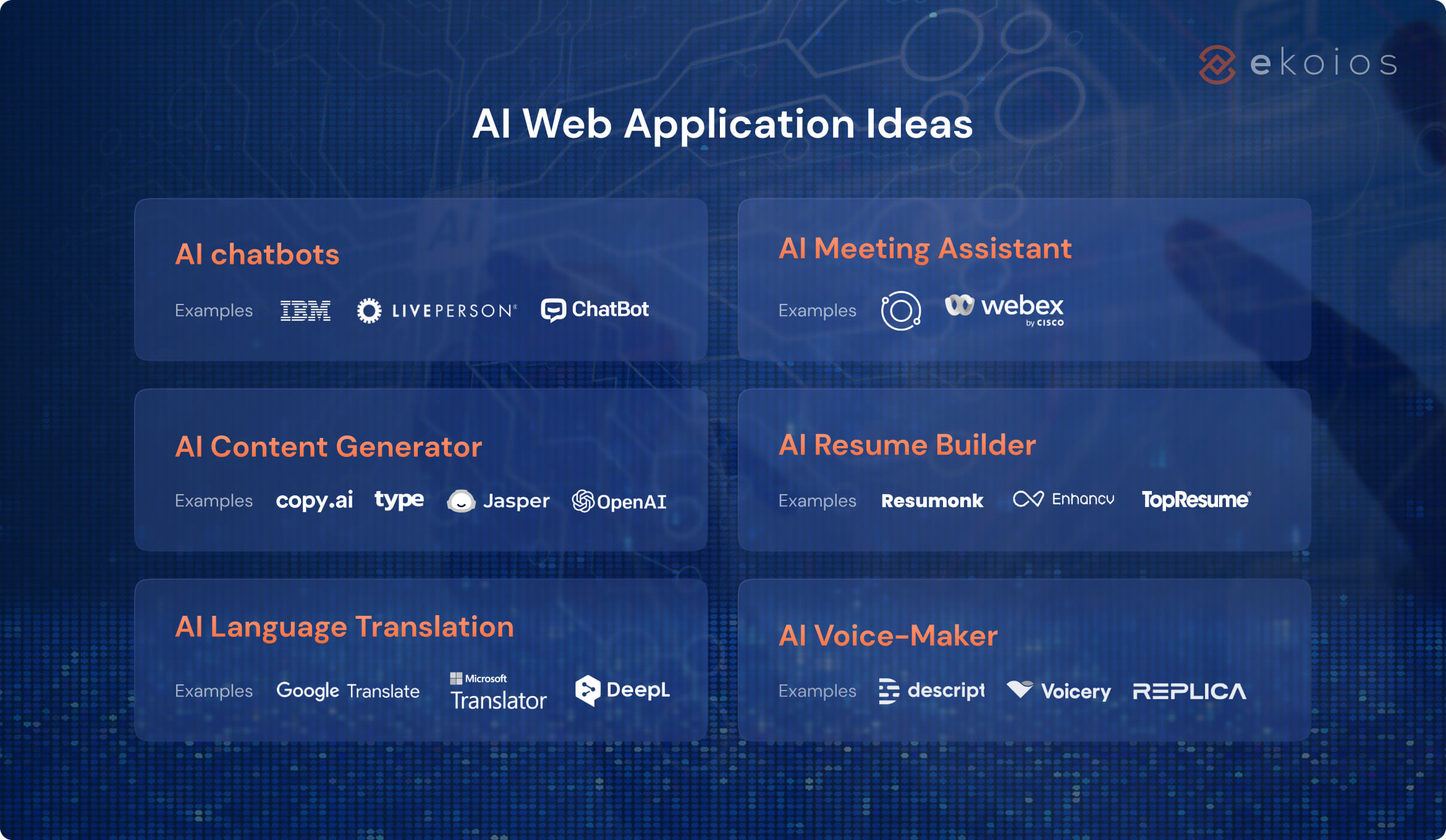
Web3 Web App Ideas
1. NFT Marketplace
You must have heard of NFTs – non-fungible tokens a.k.a digital assets that are unique, indivisible, and impossible to replicate. NFT marketplace web app can provide an online platform for buyers and sellers to trade NFTs. The platform should have a comprehensive set of tools and features that allow users to easily create, manage, and mint their own unique NFTs across popular blockchain networks. With the rise of NFTs, a marketplace for trading these digital assets could be a lucrative business opportunity for entrepreneurs looking to get involved in the blockchain space.
Factsheet:
- Possible business model: Subscription-based, commission-based, listing fee, licensing, and royalties.
- MVP build time: 3 – 6 months
- Successful examples: Opensea, Rarible, NFTify (the leading NFT marketplace platform, developed by the Ekotek team!)
🔸Read more: Key Features Of A White-label NFT Marketplace
2. Crypto Payment Gateway
Crypto payment gateways provide a secure and convenient way to accept cryptocurrency. They can be integrated with existing payment systems, allowing businesses to easily transact in Bitcoin, Ethereum, and other cryptocurrencies, or convert them into fiat money such as USD or EUR. With competitive rates and secure guarantees, a crypto wallet web app could be a great way for merchants to capitalize on the growing demand for cryptocurrency payments.
Factsheet:
- Possible business model: Subscription-based, transaction fee-based, integration and customization services.
- MVP build time: 2 – 4 months
- Successful examples: Coinbase, BitPay, CoinPayments
3. Decentralized Exchange
Decentralized exchanges (DEXs) are web apps that enable users to trade cryptocurrencies directly with each other without the need for a central authority. There is significant growth potential after multiple downfalls of centralized exchanges, prompting users to look for a more secure and fair alternative. DEXs offer key features such as non-custodial trading, increased security through the use of smart contracts, transparent transaction records, and the ability to trade without needing to reveal personal identifying information.
Factsheet:
- Possible business model: Trading fees, Token listing, Premium features.
- MVP build time: 2 months
- Successful examples: Uniswap, Kyber Network, and Bancor Network.
4. Tokenized Asset Exchange
These are web apps that allow users to buy, sell, and trade tokenized assets such as stocks, bonds, real estate, and art. As tokenized assets are digital representations of physical assets, exchange apps allow users to purchase full or fractional ownership of an asset without the need for a middleman, allowing them to diversify their portfolios and access new investment opportunities. As more traditional businesses are looking into tokenized assets, an exchange web app could be an excellent method to capitalize on this growing trend.
Factsheet:
- Possible business model: Subscription-based, pay-per-trade, Token listing fees.
- MVP build time: 3 – 6 months
- Successful examples: OpenFinance Network, and Polymarket.
🔸 Read more: In-depth Overview of Asset Tokenization
5. Launchpad
Launchpad is a platform that allows web3 companies to raise capital and launch their projects with ease. It offers a decentralized approach to fundraising, where investors can participate in token sales directly from their wallets, without the need for intermediaries. This eliminates the need for expensive listing fees and ensures that funds are securely stored on the blockchain. Additionally, crypto Launchpad provides developers with access to a large community of crypto enthusiasts who are eager to invest in promising projects and contribute to their growth.
Factsheet:
- Possible business model: platform fee, token allocation, subscription-based
- MVP build time: 1 – 2 months
- Successful examples: Binance Launchpad, TrustSwap.
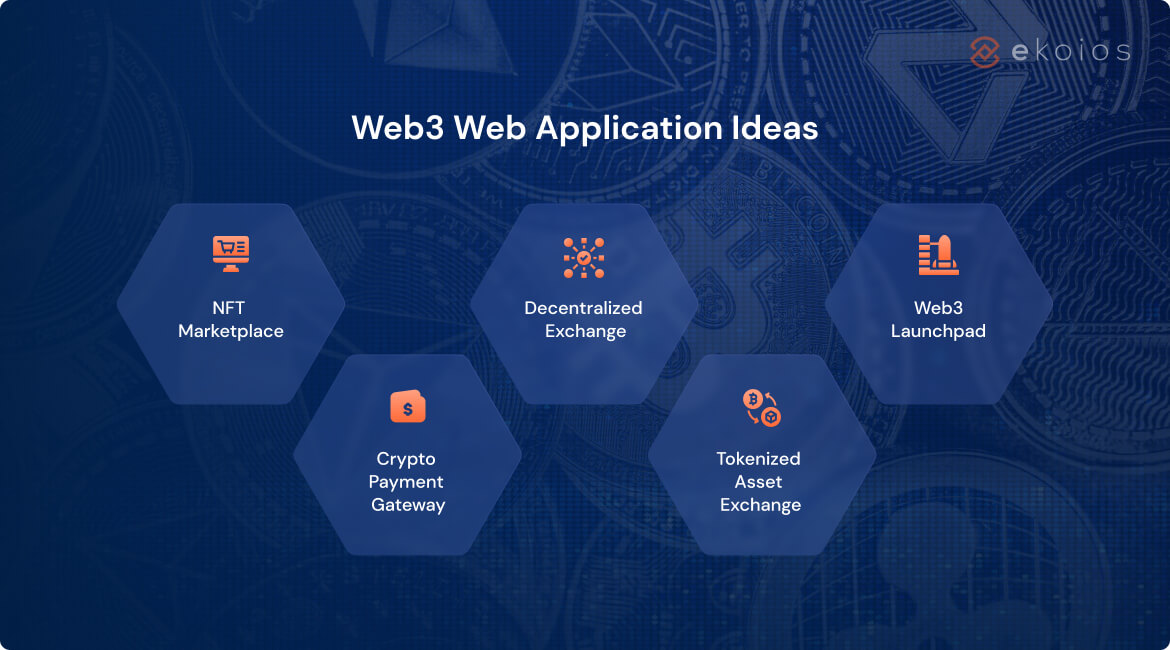
Home Services and Personal Assistance Web App Ideas for Beginners
1. On-demand Home Services
On-demand home services web apps are becoming increasingly popular as they provide users with a convenient and cost-effective way to get everyday tasks done. From plumbing and electrical repairs to house cleaning and gardening services, users can find all the help they need in the comfort of their own homes. As busy lifestyles call for convenience, a web app that can seamlessly connect buyers with verified service providers is sure to take the win.
Factsheet:
- Possible Business model: Commission-based
- MVP build time: 3 – 6 months
- Successful examples: TaskRabbit, Thumbtack, Urban Company
2. Virtual Fitness Trainer
Virtual fitness trainers are web apps that use artificial intelligence and motion-tracking technology to provide personalized fitness coaching. These apps can be used to create customized workout plans, track progress, and provide recommendations – all at a lower cost than hiring professional trainers.
Factsheet:
- Possible business model: subscription-based, pay-per-session, freemium.
- MVP build time: 2 – 4 months
- Successful examples: Auro Fitness, Fitbot, and Freeletics.
3. Remote Health Monitoring
Health monitoring apps can be used to track vital signs such as heart rate, blood pressure, and oxygen saturation levels, as well as provide users with personalized health advice and access to medical support. Remote health monitoring apps can also be integrated with existing medical systems, allowing doctors to monitor their patients remotely and provide timely and accurate diagnoses.
Factsheet:
- Possible business model: subscription-based, pay-per-use, freemium, enterprise solutions.
- MVP build time: 3 – 6 months
- Successful examples: AliveCor, CareClix, and HealthTap.
4. Intelligent Meal Planner
Intelligent meal planner web apps are designed to make meal planning easier, healthier, and more cost-efficient. These apps use artificial intelligence to analyze user preferences, dietary restrictions, and available ingredients to generate personalized meal plans. They can also be used to track grocery lists, recipes, nutrition information, and even food waste.
Factsheet:
- Possible business model: Subscription-based, freemium, advertising
- MVP build time: 2 – 4 months
- Successful examples: Mealime, PlateJoy, and Yummly.
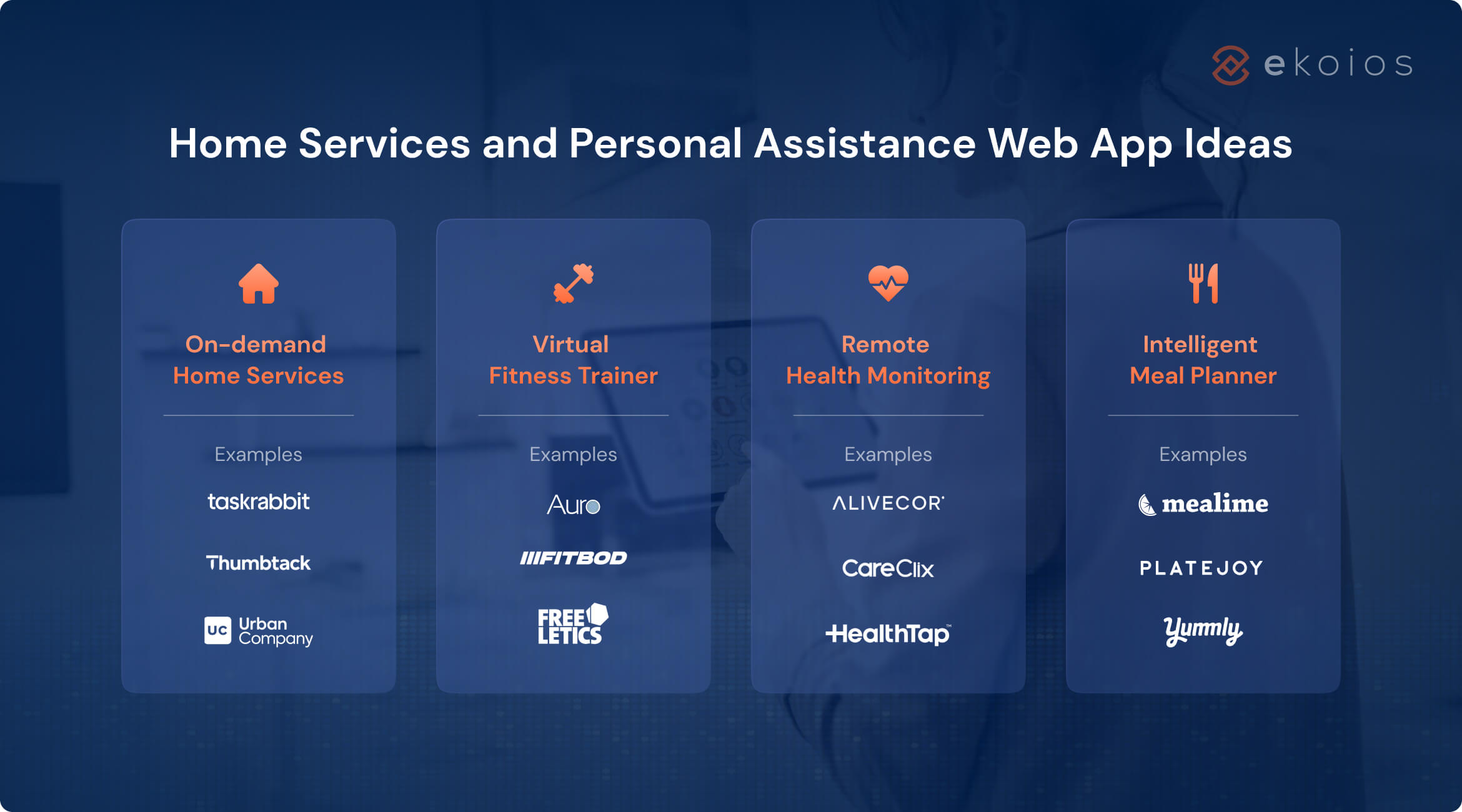
Productivity Web App
1. Remote Team Management
Designed to help teams collaborate more effectively when working remotely, these apps provide a range of features that enable teams to communicate, manage tasks, and even share documents securely. They also feature tools such as video conferencing, virtual whiteboards, and task tracking, which allow teams to become even more productive and organized. With the rising number of companies looking to cut costs via remote working, this is a niche of tremendous potential!
Factsheet:
- Possible business model: Subscription-based, freemium, enterprise licensing.
- MVP build time: 3 – 6 months
- Successful examples: Slack, Notion, Asana, and Trello.
2. Freelance Services Marketplace
These are web apps that connect freelancers with businesses looking for help with specific projects, by giving them a platform to showcase their skills. Freelance services marketplaces are also a great way for businesses to quickly find and hire experienced professionals, without having to go through the time-consuming process of searching and interviewing candidates.
- Possible business model: Commission-based, Subscription Model, Escrow Model.
- MVP build time: 3 – 6 months
- Successful examples: Upwork, Fiverr, and Freelancer.
3. Virtual Event
Virtual event platforms are web apps that allow users to host online events such as conferences, seminars, and workshops. These platforms provide users with a range of features such as video conferencing, interactive whiteboards, and real-time chat, allowing them to create an immersive and engaging experience for their attendees. Investing in a web application for virtual event platforms can be a smart move to capitalize on the increased demand for virtual events, brought about by the pandemic.
Factsheet:
- Possible business model: Subscription-based, pay-per-event, freemium, Sponsorship and advertising
- MVP build time: 3 – 6 months
- Successful examples: Zoom, Webex, Hopin.
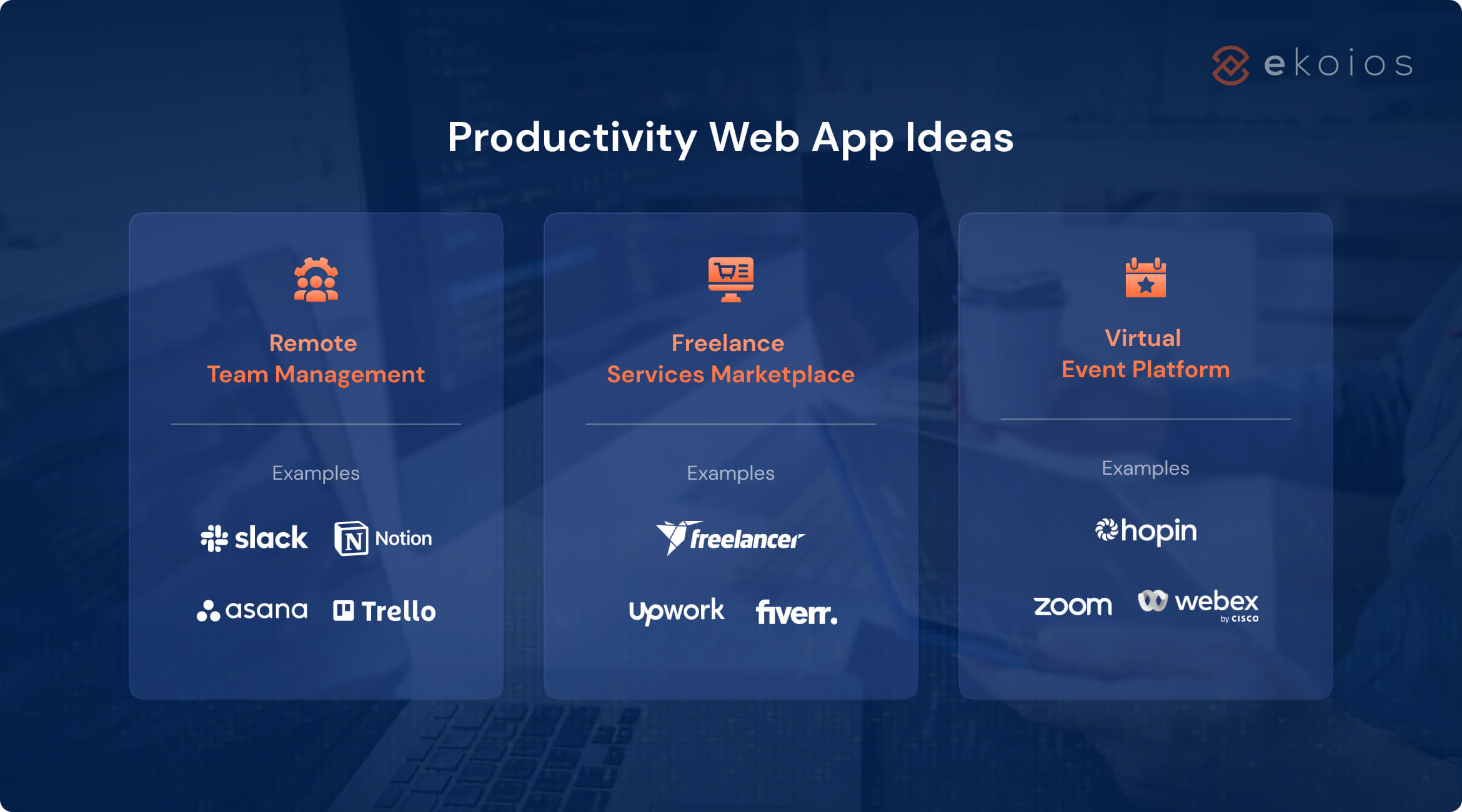
E-Learning Best Web App Ideas
1. Online Classroom
Online classroom apps help teachers and students to interact in a virtual learning environment. These apps provide a range of features that allow teachers to deliver lessons, assign tasks, and monitor student progress. With features such as video conferencing, interactive whiteboards, and real-time chat, online classroom apps can provide an immersive and engaging learning experience for students.
Factsheet:
- Possible Business model: Freemium model, Subscription-based, Enterprise model
- MVP build time: 3 – 6 months
- Successful examples: Google Classroom, Microsoft Teams
2. Online Course
Online course platforms provide users with a range of features such as course creation tools, payment processing, and analytics, allowing them to easily create and manage their courses. These platforms can be used to teach a variety of topics, from cooking and crafts to programming and business. The current market for online course platforms is growing rapidly as more people turn to the internet to learn new skills and advance their careers. With these advancements in technology and the growing demand for online education, entrepreneurs looking to build an online course platform have a promising future ahead.
Factsheet:
- Possible business model: Subscription-based, pay-per-course, freemium, enterprise solutions.
- MVP build time: 3 – 6 months
- Successful examples: Udemy, Teachable, and Thinkific.
Financial Management Web App Ideas List
1. Invoicing
Invoicing web apps make the process of creating and sending invoices quick and easy with a range of features such as customizable templates, automatic payment reminders, and online payment processing, helping users to manage their finances with ease. Invoicing web apps can also be integrated with existing accounting software, allowing businesses to streamline their bookkeeping and financial operations.
Factsheet:
- Possible business model: Subscription-based, pay-per-invoice, freemium.
- MVP build time: 2 – 4 months
- Successful examples: Invoicely, FreshBooks, and Zoho Invoice.
2. Personal Finance
Personal finance web apps help users take control of their finances. These apps provide users with an easy-to-use dashboard that displays all financial data in one place, allowing them to easily view their income, expenses, investments, and more. Personal finance dashboards also feature budgeting tools that can help users manage their spending and set financial goals.
Factsheet:
- Possible business model: Subscription-based, data monetization, freemium.
- MVP build time: 3 – 6 months
- Successful examples: Mint, YNAB.
Other Web App Ideas
1. Review platform
Review platforms are web apps that allow users to rate and review products, services, and experiences. By providing detailed information about the quality of products and services, review platforms help potential customers make informed decisions. These platforms also provide valuable data to businesses, allowing them to measure customer satisfaction and insights to improve their offerings.
- Possible business model: advertising and sponsored, subscription-based.
- MVP build time: 1 – 3 months
- Successful examples: Yelp, Clutch, and Trustpilot.
2. Travel Planner
Travel planners are web apps ideas that make it easy to plan trips and tours. They help users find the best flights, hotels, and tours, and can even suggest itineraries based on user preferences and budget.
- Possible business model: commission-based, subscription-based, booking fees.
- MVP build time: 3 – 6 months
- Successful examples: Airbnb, TripAdvisor, and Expedia.
🔸 Our Case study: Travala – The first travel booking sites that accept crypto payment
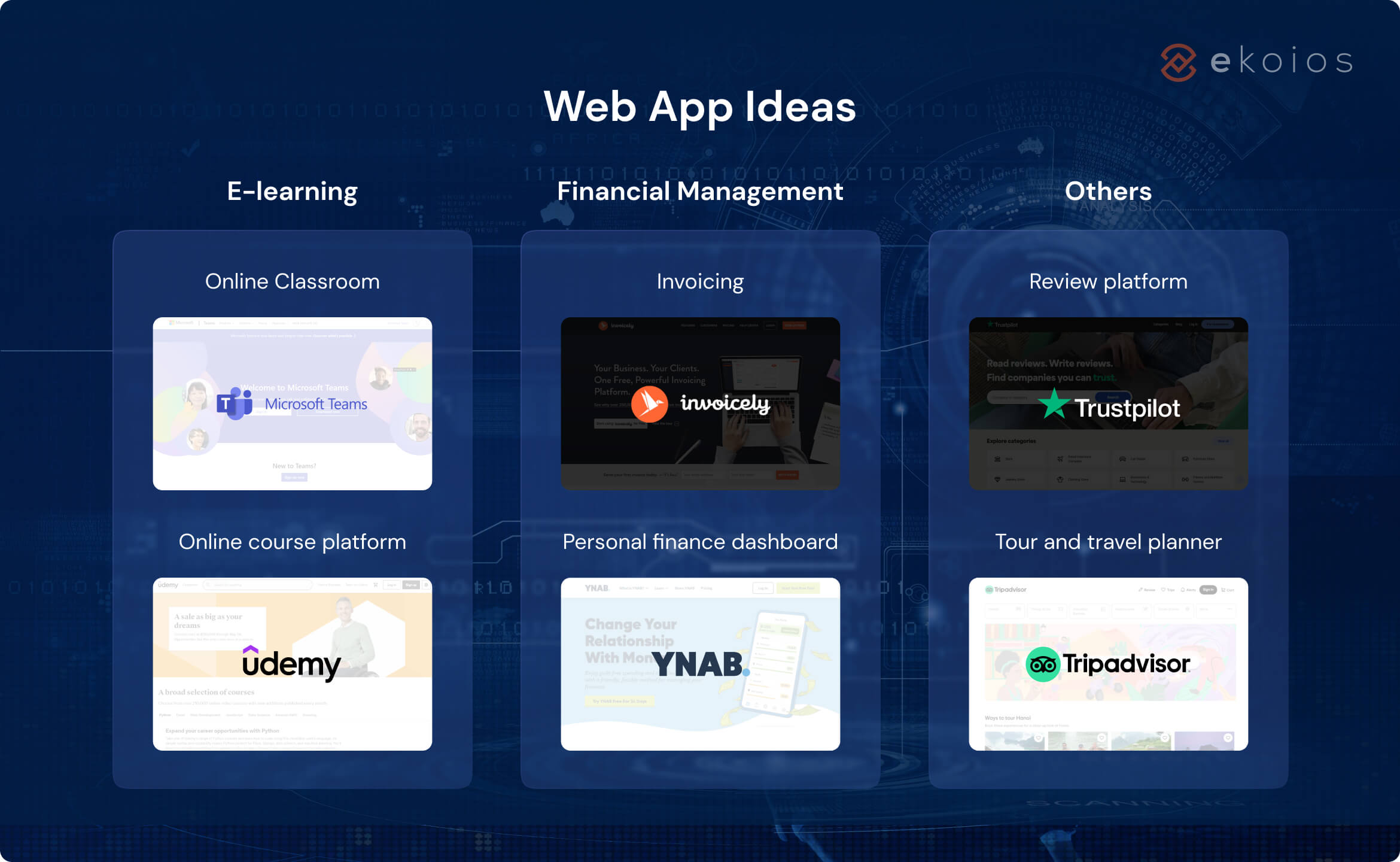
How to build a web app?
Developing a web app can be a complex process that requires careful planning and execution. Here is a step-by-step guide to help you build your web app:
-
- Define your web app ideas: Start by defining the purpose and scope of your web app. Identify the problem it will solve, its target audience and unique selling points.
- Conduct market research: Determine if there is a viable demand for your web app. Evaluate the competition, identify gaps in the market, and assess potential revenue streams.
- Find the right development firm: Look for firms with strong portfolios, similar industry coverage, client testimonials, and clear communication channels.
- Build your MVP: Work with your chosen development firm to build your Minimum Viable Product (MVP). The MVP should include essential features that address the core needs of your target audience.
- Testing & QA: Test your MVP extensively to identify bugs or issues that need to be addressed before launching to the public. Use feedback from users to improve your features and user experiences.
- Launch and market: Once you have tested and refined your web app, it’s time to launch it to the public! Develop marketing strategies to promote the app based on where your target audience spends their time online.
🔸 Check out: How much for developing a web application in 2023? (plus cost-saving tips)
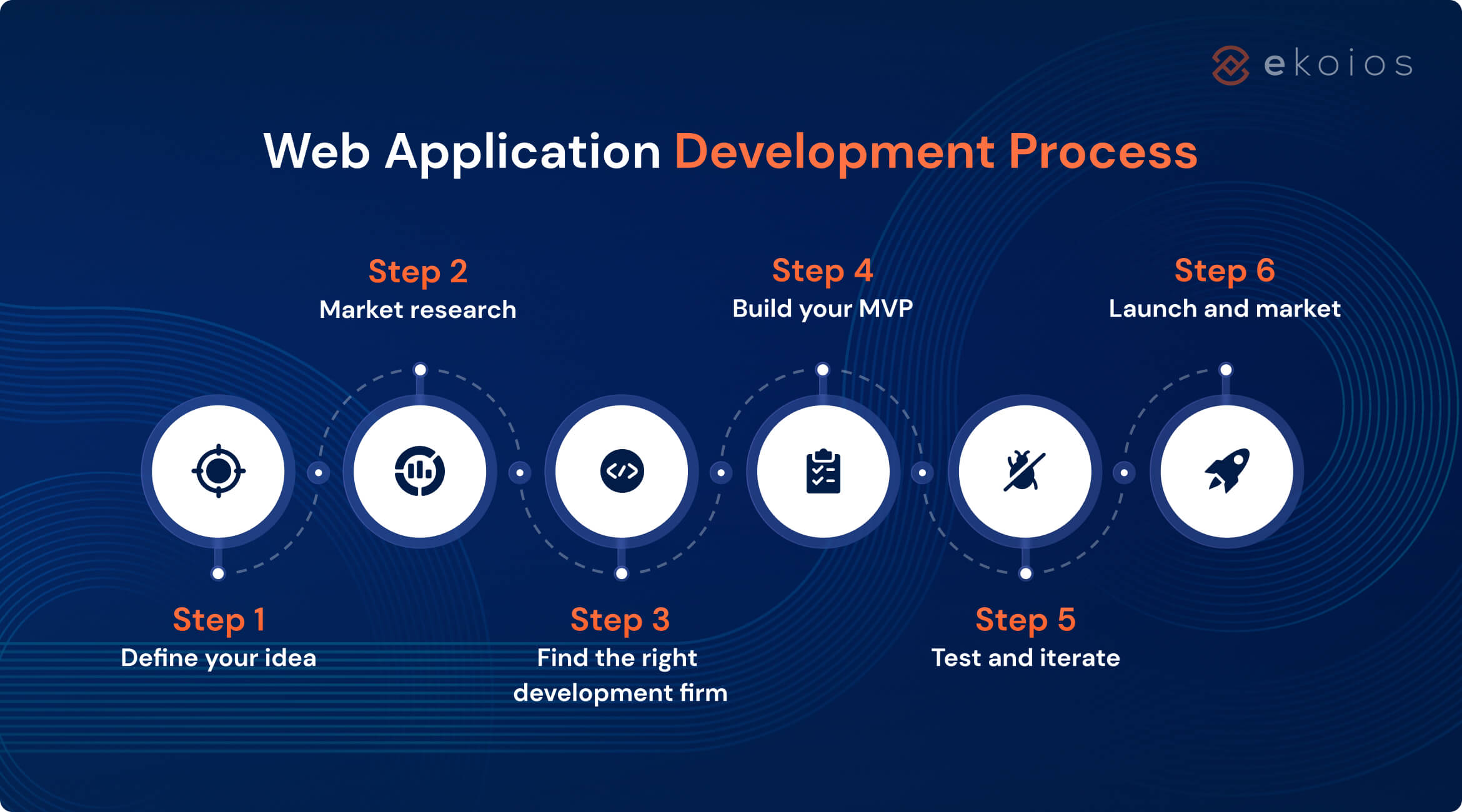
Closing thoughts
Developing web app ideas requires careful planning and execution, but the potential reward is all worth it. With the right combination of strategic planning, product development, and marketing, your web app can become an invaluable tool for users and a prominent source of income.
Investing in the right development firm and creating a well-designed product is the way to a web app that stands out from the competition. And if you need to validate your web app idea, or draft up a development plan – contact Ekotek today to discuss with our domain experts!
- 1
- 2
- 3
- 4